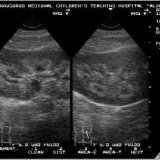Nodular goiter of the thyroid: symptoms and treatment
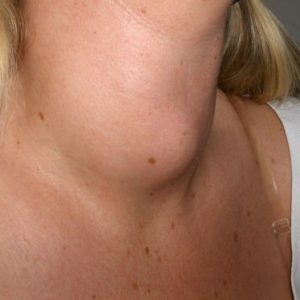 Nodular goiter is a group of various thyroid diseases that occur with the appearance of nodular formations in it.That is, this is not a separate disease and the detection of nodes requires further careful examination.
Nodular goiter is a group of various thyroid diseases that occur with the appearance of nodular formations in it.That is, this is not a separate disease and the detection of nodes requires further careful examination.
Nodular goiter variants
Quite often nodular goiter of the thyroid gland is detected accidentally, for example, during preventive medical examination.After this, first, it is first necessary to determine within which pathological condition a knotty formation was formed.
Nodules in the thyroid gland can be observed in such diseases:
- Nodal colloid goiter;
- Cyst of gland;
- Adenoma of the gland;
- Adenocarcinoma of the gland;
- Malignant tumors of the gland.
Approximately 90% of all cases of nodes are manifestations of such a disease as nodular colloid goiter.A colloidal node is an accumulation of a colloidal substance in the follicles.Approximately 5-7% of cases of nodular goiter is a manifestation of adenoma, and in 3% of cases - cancer of the gland.
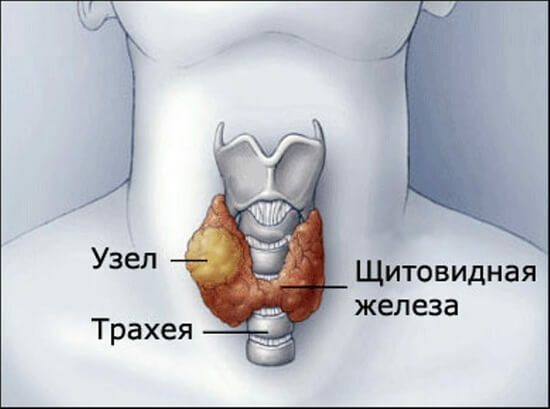
In view of the number of detectable nodes, one-node, multi-node and conglomerate struma is isolated.For multi-nodular goiter, there are several unshielded nodal formations in the thyroid gland tissue, for conglomerate - fused nodes.
Symptoms of nodular goiter
 Often the presence of nodular goiter of the thyroid gland can be suspected only with palpation of the neck.In some cases, the enlargement of the gland and the knot are noticeable even visually.The enlargement of the gland, as a rule, is asymmetrical.Thus the general state of health is not broken, and the person nothing disturbs.
Often the presence of nodular goiter of the thyroid gland can be suspected only with palpation of the neck.In some cases, the enlargement of the gland and the knot are noticeable even visually.The enlargement of the gland, as a rule, is asymmetrical.Thus the general state of health is not broken, and the person nothing disturbs.
When the knot increases greatly in size, it squeezes nearby organs.When squeezing the larynx of a person, the feeling of a coma in the throat, the attacks of suffocation and even the hoarseness of the voice are disturbing.In severe compression of large vessels, a person may be disturbed by dizziness and tinnitus.
When the nodular goiter flows against the background of a normal level of thyroid hormones, one speaks of euthyroid goiter.In the case of nodular goiter with reduced gland function, the state of hypothyroidism develops. This condition is characterized by the following symptoms:
- Rapid fatigue, drowsiness;
- Depressed mood;
- Overweight;
- Bradycardia;
- Constipation;
- Dry skin, as well as hair loss.
Nodular goiter can also occur with hyperthyroidism, this is a condition of hyperthyroidism( thyrotoxicosis). In favor of this condition are the following signs:
- Increased appetite;
- Weight Loss;
- Insomnia;
- Irritability;
- Euphotic;
- Brilliant eyes;
- Tachycardia;
- Tremor;
- Diarrhea;
- Body temperature is 37 degrees.
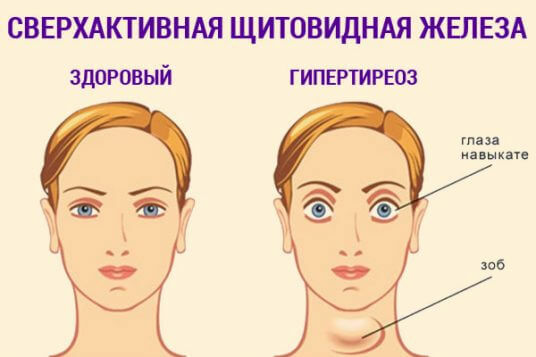
Diagnosis
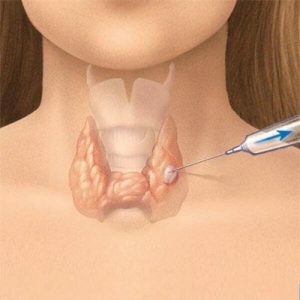 If you suspect a nodal goiter, you need to go through some research.The most affordable and inexpensive diagnostic method is ultrasound.Research allows you to identify even the smallest nodes, determine their size.
If you suspect a nodal goiter, you need to go through some research.The most affordable and inexpensive diagnostic method is ultrasound.Research allows you to identify even the smallest nodes, determine their size.
To exclude a malignant process, a fine needle aspiration biopsy is performed: the needle is taken from the node.In the case of a colloidal node, in the study of the selected punctate, a colloid substance and thyrocytes are determined.
With autoimmune thyroiditis, the colloidal substance is not detected in the selected punctate, but lymphoid cells are found in large numbers.With nodal toxic goiter, a large number of proliferating thyrocytes is determined in the punctate.
To determine the functional activity of the thyroid, examine the level of such indicators in the blood:
- Triiodothyronine, thyroxine;
- Thyroid-stimulating hormone;
- Antibodies to thyroglobulin;
- Thyreocalcitonin.
The obtained data will allow to define a hypofunction or hyperfunction of a thyroid gland.The detection of a high level of thyrocalcitonin may be indicative of the medullary cancer of the gland.
Treatment of nodular goiter
Important! Features of the treatment of nodular goiter will depend on the pathological condition against which the node was formed.
Treatment can be medicated and surgical.So, in the case of nodular goiter that occurs with hypothyroidism, the administration of L-thyroxine is prescribed.With nodular goiter against thyrotoxicosis, antithyroid drugs( Tyrosol, Merkazolil) are prescribed, which suppress the activity of the gland.
The following nodes are surgically removed:
- With malignant traits;
- Stand-alone units;
- Nodes with in-place localization;
- Squeezing nearby organs;
- Fast-Growing.
The volume of the proposed operation can vary significantly.In the case of a single node, enucleation can be performed.With multiple nodular goiter, subtotal and even total resection of the thyroid gland can be performed.To complete removal of the gland resorted to in case of malignant organ damage and with thyrotoxicosis.

Thus, if a person has a node in the thyroid, this does not mean that it must necessarily be removed.If the nodal goiter has signs of a benign process, do not bother the person, then the patient is recommended active surveillance by the endocrinologist.Regular examinations at the doctor will allow to supervise pathological process.
Grigorova Valeria, medical reviewer


